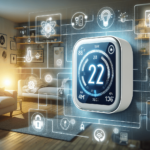Are you curious about how long your smart light bulbs are expected to last? Well, you’re in luck! In this article, we’ll be exploring the lifespan of typical smart light bulbs. Whether you’re a tech enthusiast or just looking to upgrade your home lighting, understanding the longevity of these innovative bulbs will help you make informed decisions and get the most out of your purchase. So, sit back, relax, and let’s shed some light on this fascinating topic!
Understanding Smart Light Bulbs
Definition of smart light bulbs
Smart light bulbs are a type of light bulb that can be controlled remotely using technology such as Wi-Fi or Bluetooth. These bulbs can be connected to a smartphone, tablet, or smart home system, allowing you to control the brightness, color, and even schedule the lighting from anywhere. They offer convenience, energy efficiency, and customization options that traditional light bulbs lack.
Advantages of using smart light bulbs
There are several advantages to using smart light bulbs. First and foremost, they offer convenience. With smart light bulbs, you can control the lighting in your home with just a few taps on your smartphone or by using voice commands with virtual assistants like Alexa or Google Assistant. This means you no longer have to get up from your couch or bed to turn off the lights.
Secondly, smart light bulbs are energy-efficient. Many smart bulbs are designed to be energy-saving and use LED technology, which is known for its lower energy consumption compared to traditional incandescent bulbs. With the ability to dim the lights or set them to turn off automatically when not in use, you can further reduce your energy usage and save on your electricity bills.
Another advantage of smart light bulbs is the ability to customize your lighting. You can adjust the brightness levels, choose from a wide range of colors, and even create preset scenes for different moods or occasions. Whether you want a cozy warm light for a movie night or vibrant colors for a party, smart bulbs can easily transform the ambience of your space.
Types of smart light bulbs
There are various types of smart light bulbs available in the market, each with its own unique features and capabilities. The most common types include:
Wi-Fi-enabled bulbs: These bulbs connect to your home Wi-Fi network, allowing you to control them using a smartphone app or voice commands.
Bluetooth-enabled bulbs: These bulbs connect directly to your smartphone or tablet via Bluetooth, eliminating the need for a separate hub or Wi-Fi connection.
Zigbee or Z-Wave bulbs: These bulbs require a separate hub or gateway device to connect to your home network. They offer greater compatibility with other smart home devices and can be controlled through a central smart home system.
Color-changing bulbs: These bulbs not only offer adjustable brightness but also allow you to choose from a wide spectrum of colors. They are perfect for creating dynamic lighting effects or setting the mood for different activities.
Factors Affecting Lifespan
Quality of the bulb
The quality of the smart light bulb itself plays a significant role in its lifespan. Higher-quality bulbs with better components and craftsmanship tend to last longer compared to cheaper alternatives. When purchasing smart bulbs, it is important to choose reputable brands known for their high-quality products.
Hours of usage
The number of hours you use your smart light bulbs each day directly impacts their lifespan. Just like traditional bulbs, smart bulbs have a limited number of hours they can operate before they start to degrade. If you use your bulbs for extended periods each day, they may not last as long as if you use them for shorter durations.
Operating conditions
The operating conditions in which the smart bulbs are used can also affect their lifespan. Extreme temperatures, such as excessive heat or cold, can cause the components to deteriorate faster, shortening the bulb’s lifespan. It is important to ensure that the smart bulbs are used within the recommended temperature range specified by the manufacturer.
Power surges and voltage fluctuations
Power surges and voltage fluctuations can significantly impact the lifespan of smart light bulbs. These sudden increases or decreases in power can cause damage to the bulb’s internal circuitry and reduce its overall lifespan. It is advisable to use surge protectors or voltage stabilizers to protect your smart bulbs from such electrical fluctuations.

Expected Lifespan of Smart Light Bulbs
Manufacturer claims
Smart light bulb manufacturers typically provide an estimated lifespan for their products. This lifespan is often expressed in terms of the number of hours the bulb can be used before it reaches a certain percentage of its initial brightness. However, it is important to note that these claims are based on ideal conditions and may not always reflect real-world usage.
Average lifespan based on user experience
The actual lifespan of smart light bulbs can vary widely based on user experience. Factors such as the quality of the bulb, operating conditions, and usage patterns can influence how long the bulb lasts. Users have reported lifespans ranging from a couple of years to over a decade, depending on these factors.
How to extend the lifespan of smart light bulbs
To extend the lifespan of your smart light bulbs, there are a few steps you can take. First, ensure that you purchase high-quality bulbs from reputable manufacturers. These bulbs are often built to higher standards and are more likely to last longer.
Secondly, be mindful of your usage patterns. Avoid leaving the lights on for extended periods when not needed. Instead, make use of the smart features such as scheduling or occupancy sensors to automatically turn off the lights when they are not in use.
Regular maintenance and cleaning are also important for maintaining the longevity of smart light bulbs. Dust and dirt can accumulate on the bulb’s surface, reducing its brightness and potentially overheating the internal components. Clean the bulbs regularly with a soft cloth to keep them in optimal condition.
Lastly, use appropriate dimming levels. If your smart bulbs offer dimming capabilities, ensure that you do not dim them too low. Extremely low dimming levels can strain the bulb’s circuitry and impact its lifespan. It is advisable to stay within the recommended dimming range specified by the manufacturer.
Common Problems That Affect Lifespan
Quality of components
The quality of the components used in smart light bulbs can have a direct impact on their overall lifespan. Cheaper bulbs may use lower-quality components that are more prone to failure or degradation over time. It is important to choose bulbs from reputable brands that are known for their quality and reliability.
Overheating
Overheating is a common problem that can significantly reduce the lifespan of smart light bulbs. When the bulbs are used for extended periods or in high-temperature environments, the excess heat can cause damage to the internal components. Proper ventilation and avoiding enclosed fixtures can help mitigate the risk of overheating.
Firmware or software issues
Smart light bulbs rely on firmware or software to operate and communicate with other devices. However, these software components can sometimes be susceptible to bugs or glitches that can affect the bulb’s performance and lifespan. Keeping the firmware and accompanying apps up to date can help minimize the impact of these issues.
Compatibility issues
Compatibility issues can arise when trying to connect smart light bulbs with different smart home systems or devices. In some cases, these compatibility issues can lead to connectivity problems or inconsistent performance, which may affect the overall lifespan of the bulbs. It is essential to ensure that the bulbs you choose are compatible with your existing smart home ecosystem.

Replacing Smart Light Bulbs
When to replace
Knowing when to replace your smart light bulbs is crucial to ensure optimal performance and energy efficiency. As the bulbs age, their brightness starts to degrade, and they may become less reliable or responsive to control. If you notice a significant decrease in brightness or frequent connectivity issues, it may be time to consider replacing the bulbs.
Recycling and proper disposal
When it comes to replacing smart light bulbs, it is important to dispose of them properly. Smart bulbs contain electronic components and hazardous materials that should not be thrown in the regular trash. Check with your local recycling or waste management facility for guidelines on how to recycle or dispose of smart bulbs in an environmentally friendly manner.
Comparing Lifespan: Smart vs Traditional Bulbs
Comparison of average lifespans
On average, smart light bulbs tend to have a longer lifespan compared to traditional incandescent bulbs. Traditional incandescent bulbs typically last for around 1,000 to 2,000 hours, while smart LED bulbs can last anywhere from 15,000 to 25,000 hours. This significant increase in lifespan is attributed to the energy-efficient LED technology used in smart bulbs.
Environmental impact
The longer lifespan of smart bulbs has a positive impact on the environment. With less frequent replacements, fewer bulbs end up in landfills, reducing waste and the resources required for manufacturing new bulbs. Additionally, the energy efficiency of smart bulbs contributes to reducing overall energy consumption and the associated environmental impact.

Factors to Consider Before Purchasing
Lifespan expectations based on needs
Before purchasing smart light bulbs, it is important to consider your specific needs and lifespan expectations. If you plan to use the bulbs for extended periods each day, you may want to invest in higher-quality bulbs with longer lifespans. On the other hand, if you have a specific usage pattern or plan to upgrade to new technology in the near future, you may opt for more affordable options.
Warranty and customer support
When purchasing smart light bulbs, it is advisable to check the warranty and customer support offered by the manufacturer. A longer warranty period and responsive customer support can provide peace of mind and assurance of the product’s quality. In case of any issues or premature failures, a good warranty and reliable customer support can make the replacement process hassle-free.
Extending Lifespan of Smart Light Bulbs
Proper usage habits
Adopting proper usage habits can help extend the lifespan of smart light bulbs. Avoid leaving the lights on when not needed, and make use of scheduling or occupancy sensors to automate the lighting based on occupancy or time of day. Turning off the lights during daylight hours can significantly reduce their overall usage and extend their lifespan.
Regular maintenance and cleaning
Regular maintenance and cleaning are important for keeping smart light bulbs in good condition. Dust and dirt can accumulate on the bulb’s surface, affecting its brightness and potentially overheating the internal components. Dust the bulbs regularly with a soft cloth to keep them clean and functioning optimally.
Appropriate dimming levels
When using dimming functionality, ensure that you stay within the recommended dimming range specified by the manufacturer. Extremely low dimming levels can strain the bulb’s circuitry and impact its lifespan. Using appropriate dimming levels can help ensure the longevity of your smart light bulbs.

Reviews and Recommendations
Longest-lasting smart light bulbs
Several smart light bulb brands are known for their longevity and reliability. Brands like Philips Hue, LIFX, and Sengled have received positive reviews for their long-lasting bulbs. Users have reported these bulbs lasting for several years without any significant decrease in performance.
Brands with good reputation and customer feedback
Apart from lifespan, it is important to consider the overall reputation and customer feedback of smart light bulb brands. Brands like Philips, LIFX, and TP-Link have a good track record in terms of customer satisfaction and reliable products. Reading reviews and checking customer feedback can help you make an informed decision when purchasing smart light bulbs.
The Future of Smart Light Bulbs
Technological advancements
The future of smart light bulbs looks promising, with continuous technological advancements being made in the field. These advancements aim to further improve the lifespan, efficiency, and capabilities of smart bulbs. From improved connectivity options to better energy-saving features, the future of smart bulbs is expected to bring even more convenience and customization to users.
Expected improvements in lifespan
As technology continues to progress, we can expect further improvements in the lifespan of smart light bulbs. Manufacturers are constantly working on enhancing the quality of components, optimizing internal circuitry, and exploring new materials to further extend the lifespan of these bulbs. With these advancements, smart light bulbs are anticipated to have even longer lifespans in the future.
In conclusion, smart light bulbs offer a convenient and energy-efficient lighting solution that can be controlled remotely. The lifespan of these bulbs can vary based on factors such as quality, usage, operating conditions, and common problems like overheating or compatibility issues. To extend the lifespan of smart light bulbs, proper usage habits, regular maintenance, and appropriate dimming levels are recommended. When considering purchasing smart light bulbs, it is important to assess your specific needs, consider warranty and customer support, and explore reliable brands with a good reputation. With continuous technological advancements, the future of smart light bulbs looks bright, promising even longer lifespans and improved features.











